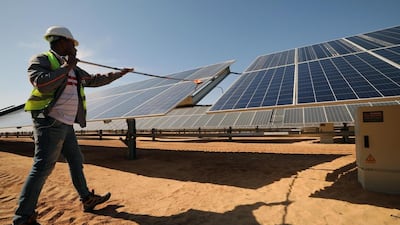Nearly 500,000 new jobs were created in the renewable sector last year, bringing the total to 11.5 million in 2019, according to a new report by the International Renewable Energy Agency.
This was 4.5 per cent higher than in 2018, the Abu Dhabi-based agency said in the seventh edition of its Renewable Energy and Jobs report.
Employment in the sector is led by the solar photovoltaic (PV) industry with nearly 3.8 million jobs, or a third of the total.
It was followed by the biofuel, hydropower and wind industries, with 2.5 million, 2 million and 1.2 million jobs, respectively.
“Adopting renewables creates jobs and boosts local income in both developed and developing energy markets,” Francesco La Camera, Irena’s director general, said.
“While today we see a handful of countries in the lead … each country can harness its renewable potential, take steps to leverage local capabilities for industrial development and train its workers,” he added.
The world has witnessed encouraging growth in the number of renewables jobs, but this could be much higher by adopting a “comprehensive policy framework that drives the energy transition”, the report said.
Irena said in June this year that a green stimulus programme could create up to 5.5 million more jobs over the next three years than a business-as-usual approach. Such an initiative would also allow the global economy to create 42 million renewables jobs by 2050.
In 2019, Asia accounted for nearly 63 per cent of total jobs in renewables.
China led with a share of 38 per cent of the total and employed nearly 4.4 million people in the sector. Brazil employed 1.2 million people (10 per cent), while India and the US employed 833,000 (7.2 per cent) and 756,000 (6.5 per cent) people, respectively.
Job creation was limited to a few countries, but benefits were more evident, especially through the deployment of solar PV technologies, the report said.
The Covid-19 pandemic, which shuttered borders and disrupted trade, has impacted the energy industry as well, the report said.
The sector was affected by temporary disruptions in the supply of equipment, components, raw materials and by demand-side impacts. However, renewable energy as a whole has fared better than fossil fuels.
“Although the pace of new renewables installations has been slower in 2020 than predicted in pre-Covid forecasts, construction of many large-scale utility projects is proceeding, though with some delays,” the report said.
“Jobs appear less affected in the operation of utility-scale wind and solar plants than in solar rooftop installation and off-grid solutions, where social distancing requirements and constrained household budgets have a significant impact.”

Renewables jobs have also been more inclusive and offered a better gender balance than fossil fuel industries. The report showed that women held 32 per cent of total renewables jobs in 2019, as opposed to 21 per cent in fossil fuel sectors.
On average, the spending of $1 million on renewables created 7.49 full-time equivalent jobs, almost triple the 2.65 full-time equivalent jobs in fossil fuels.
The report also urged policymakers to prioritise reskilling for fossil fuel sector workers who have lost or are at risk of losing their livelihoods.
An analysis published by Environmental Entrepreneurs, the American Council on Renewable Energy, E4TheFuture, and BW Research Partnership in May this year showed that more than 400,000 clean energy jobs were lost as a result of the pandemic.



